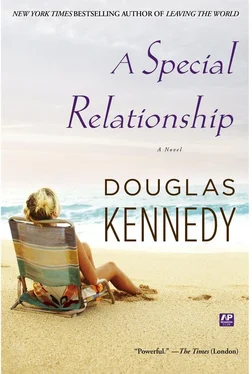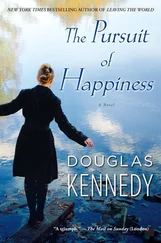'Especially since, I bet you anything, Ms Social Worker walked around Ms Rich Bitch's designer house, saw the photos of her with Tony and the Missus at Downing Street, was probably flattered to death to be taken so seriously by such a player, that she turned all star fucky... excuse my American'.
'You're excused', I said. 'And I think you're right'.
'Who's up next this afternoon?'
'My wonderful husband'.
'I can't wait'.
I had to hand it to Tony, his testimony was masterful - a true performance, of the convincing sort I used to see him trot out in front of some heavyweight Arab foreign minister, from whom he wanted something. Tony in the witness box became Anthony Hobbs of the Chronicle: erudite, serious, a man of gravitas, yet also one of great compassion, especially when it came to dealing with his tragically wayward wife. Encouraged to wax humanitarian by Lucinda Fforde, he took her through the entire story of my breakdown, how he tried so hard to help me through it, how I rejected his support, and how he still stuck by me even after I threatened the life of our son.
Then he went into his 'friendship' with Diane Dexter - that, yes, it had always been a flirtatious friendship, but it had never been anything other than that, until his marriage began to disintegrate, and he began to fear for the safety of his son. And then he made an impassioned 'new man' spiel about how fatherhood had been the best thing that had ever happened to him, how he had never really understood the remarkable joy and pleasure that having a child could bring to your life, just as he could not ask for a more remarkable (yes, he used that word twice) partner than Diane Dexter (and he looked directly at her as he sang her praises), and he was desperately, desperately distressed by the fact he had no choice but to take Jack away from my 'self-destructive rampage', but he did hope that - once I found my equilibrium again - I could perhaps play a role in his life. For the moment, however, he was fully committed to being Jack's 'principal carer', which is why he had decided to give up his job on the Chronicle, and how - when they moved to Australia next month - he would also not be seeking full-time employment for at least another year or so, in order 'to be there for Jack'.
As Tony went on with this at one with his inner child routine, my growing sense of rage was only mitigated by the fear that Sandy might start making nauseated sounds in the back row.
Then Maeve Doherty stepped up to the plate. She looked at him with cool detachment.
'Now then, Mr Hobbs', she began. 'We've just heard your appreciation of the joys of fatherhood. Which, of course, is most commendable. Just out of interest, sir, why did you wait so long before having children?'
'My Lord', Lucinda Fforde said, sounding truly annoyed. 'I really must object to this line of questioning. What on earth does this have to do with the matter at hand?'
'Let the witness answer the question', Traynor said.
'And I'm happy to answer it', Tony said. 'The reason I didn't have children until I met Sally was because of the nature of my profession, and the fact that, because I was a nomadic journalist - wandering from war to war, foreign capital to foreign capital - I simply never had the chance to meet someone, settle down. But then I met Sally - and her pregnancy coincided with my return to London and the foreign editorship of the Chronicle. So this seemed like the ideal moment to make a commitment both to her and to fatherhood'.
'And before this, you simply had no experience of fatherhood?'
'No, none whatsoever'.
'You're obviously making up for lost time'.
'Ms Doherty... ', Traynor said witheringly.
'I withdraw the comment. Now Mr Hobbs, let's turn to another pertinent issue here... your decision to leave the Chronicle. You worked for the Chronicle for over twenty years. Is that correct?'
'Yes, that's right'.
'One of their most distinguished foreign correspondents, covering, as you mentioned, a goodly number of wars, not to mention being the Chronicle's man in Washington, Tokyo, Frankfurt, Paris, Cairo. And then, just over a year ago, you were re-called to London to become the Foreign Editor. Were you pleased about this re-call?'
'My Lord, I must object again', Lucinda Fforde said. 'This is deviating from the...'
'Do let us complete this witness's cross-examination', Traynor said. 'Please answer the question, Mr Hobbs'.
'It was... yes, I'll admit it... it was rather difficult to adjust at first to office life again. But I did settle in...'
'Even though, some months later, you not only quit the foreign editorship, but also resigned from the paper. And during this same week, you also decided to end your marriage to Ms Goodchild, to seek an emergency court order in order to gain residence of your son, and move in with Ms Dexter. Quite a number of life changing decisions in just a matter of days, wouldn't you agree?'
'The decisions I made were all predicated on the danger I perceived my son to be in'.
'All right, let's say you did decide it was important that you be at home with Jack for a while. Surely the Chronicle has a reasonably enlightened management, and surely, had you gone to them and said you wanted a leave of absence for personal matters, they would have been sympathetic. But to quit your job just like that, after over two decades with the paper? Why did you do that?'
'It wasn't "just like that", it was a decision which had been building for some time'.
'Ah then, so you really didn't readjust to life behind a desk at Wapping... ?'
'Not precisely. It was just time to move on...'
'Because?'
'Because I had discovered other ambitions'.
'Literary ambitions, perhaps?'
'That's right. I was writing a novel'.
'Ah yes, your novel. In her witness statement - which you have undoubtedly read - Ms Goodchild reports that, after your son came home from hospital, you became increasingly preoccupied with your novel, locking yourself up in your study, sleeping up there as well, making your wife deal with the broken nights, the four am feeds, and all the other messy bits of child care'.
Tony had anticipated this question and was completely prepared for it.
'I think that is a profoundly unfair interpretation of the situation. After Sally lost her job...'
'Didn't your wife have no choice but to give up work because of a medical condition which threatened her pregnancy?'
'All right. After my wife was forced to give up work, I was the family's only source of income. I was putting in nine - to ten-hour days at the Chronicle, a newspaper at which I was no longer happy, and I was also attempting to fulfil a long-standing ambition to write fiction. On top of that, I was also coping with my highly unstable wife who was in the throes of a major depression...'
'But who was still coping with all the difficult business of child care. You didn't have a nanny at home, did you Mr Hobbs?'
'No - but that's because finances were a little tight'.
'So your wife had to handle all that herself. And for someone in the throes of a major postnatal depression, she handled all that rather remarkably, wouldn't you agree?'
'She spent nearly two months in a psychiatric ward'.
'Where your son was looked after as well. Leaving you plenty of time to develop your friendship with Ms Dexter into something else...'
Traynor let out one of his exasperated sighs.
'Miss Doherty, please resist the temptation to conjecture'.
'Apologies, My Lord. Now when your wife did leave hospital - and it should be pointed out that, recognizing she did have a problem, she remained in that psychiatric unit of her own accord - did you not find her a calmer, more rational person?'
'From time to time, yes. But she was also prone to terrible mood swings'.
Читать дальше












